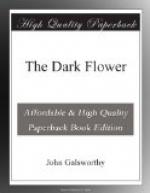“So, you see, that was all. You might forgive me, Sylvia!”
And to Anna it seemed verily as if those two young faces formed suddenly but one—the face of youth.
If she had stayed there looking for all time, she could not have had graven on her heart a vision more indelible. Vision of Spring, of all that was gone from her for ever! She shrank back out of the fork of the old ash-tree, and, like a stricken beast, went hurrying, stumbling away, amongst the stones and bracken. She ran thus perhaps a quarter of a mile, then threw up her arms, fell down amongst the fern, and lay there on her face. At first her heart hurt her so that she felt nothing but that physical pain. If she could have died! But she knew it was nothing but breathlessness. It left her, and that which took its place she tried to drive away by pressing her breast against the ground, by clutching the stalks of the bracken—an ache, an emptiness too dreadful! Youth to youth! He was gone from her—and she was alone again! She did not cry. What good in crying? But gusts of shame kept sweeping through her; shame and rage. So this was all she was worth! The sun struck hot on her back in that lair of tangled fern, where she had fallen; she felt faint and sick. She had not known till now quite what this passion for the boy had meant to her; how much of her very belief in herself was bound up with it; how much clinging to her own youth. What bitterness! One soft slip of a white girl— one young thing—and she had become as nothing! But was that true? Could she not even now wrench him back to her with the passion that this child knew nothing of! Surely! Oh, surely! Let him but once taste the rapture she could give him! And at that thought she ceased clutching at the bracken stalks, lying as still as the very stones around her. Could she not? Might she not, even now? And all feeling, except just a sort of quivering, deserted her—as if she had fallen into a trance. Why spare this girl? Why falter? She was first! He had been hers out there. And she still had the power to draw him. At dinner the first evening she had dragged his gaze to her, away from that girl—away from youth, as a magnet draws steel. She could still bind him with chains that for a little while at all events he would not want to break! Bind him? Hateful word! Take him, hankering after what she could not give him—youth, white innocence, Spring? It would be infamous, infamous! She sprang up from the fern, and ran along the hillside, not looking where she went, stumbling among the tangled growth, in and out of the boulders, till she once more sank breathless on to a stone. It was bare of trees just here, and she could see, across the river valley, the high larch-crowned tor on the far side. The sky was clear—the sun bright. A hawk was wheeling over that hill; far up, very near the blue! Infamous! She could not do that! Could not drug him, drag him to her




